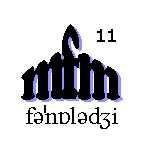This is an archive page; this conference occurred in May 2003.
The site for the 12mfm is available here.
...the North West Centre for Linguistics presents...
 |
The 11th
Manchester Phonology Meeting
Thursday 22nd - Saturday 24th May 2003
|


programme
|| travel/accommodation
|| special
session || booking
form

Programme
We are pleased to announce the programme for the 11mfm, with a wide
range of full papers and posters. All speakers (apart from the
invitees in the special session) and anyone else who would like to
attend must fill out and return a booking form (see below). Due to the number of high quality abstracts
submitted, there are parallel sessions again this year; where
possible, these parallel sessions are themed. The programme
is available on a separate page - to see it, click here.
The programme is relatively fixed now, although some slight alterations
may still occur...

Travel
and accommodation
Detailed information on accommodation possibilities and on how to get
to the conference (with a selection of maps) are provided on separate
pages:
- click here
to go to the accommodation
page [link removed]
- click here
to go to the travel
page [link removed]

Special
session
In addition to the general sessions, which feature papers on a wide
range of phonological, phonetic and associated disciplines, a special
themed session has been organised for Friday afternoon by Ricardo Bermúdez-Otero (Newcastle),Patrick Honeybone (Edge Hill) and Nigel Vincent (Manchester). This
will feature invited speakers
and will conclude in an open discussion session when contributions from
the audience will be very welcome.
Historical
Phonology and Phonological Theory
Historical perspectives have long helped to shape phonological theory,
and historical phonologists have long sought to test the validity of
theoretical models using data from phonological change. There is, for
example, a long tradition of enquiry that uses evidence from historical
change (e.g. processes of lenition) to probe the nature and structure
of
phonological representations.. The importance that theoretical
phonologists have placed on historical data has varied over the years,
but it is currently proving to be uniquely relevant to theoretical
debates in several phonological fields. Diachronic evidence has a
direct
bearing on the nature and status of markedness constraints, which take
on a central role in the phonological grammar in the model of
Optimality
Theory; however, several critics of OT have argued that markedness
generalizations are in fact mere epiphenomena of recurrent processes of
diachronic change, and, as these are driven by performance factors,
they should be excluded from 'phonology' proper. For other authors,
these performance factors are the direct base of phonology. It
is also the case that the rise of strictly parallel approaches to the
morphology-phonology interface, such as OT, has posed a challenge to
long-accepted views of the life cycle of phonological patterns,
according to which rules tend to rise from lower to higher phonological
strata in the course of their historical evolution. These are some of
the issues that will be addressed in the session, along with the
discussion of our speakers' diachronic data.
Speakers (in alphabetical order):
 Mark Hale (Concordia)
Mark Hale (Concordia)
 Paul Kiparsky (Stanford)
Paul Kiparsky (Stanford)
 Aditi Lahiri (Konstanz)
Aditi Lahiri (Konstanz)
 April McMahon (Sheffield)
April McMahon (Sheffield)

Booking
form
The conference fee is GBPounds 90.00
(for bookings received by 8th May 2003). Packages excluding one or more
meals are also available at a reduced rate. Students and unwaged
participants pay the reduced rate of GBP
45.00 (for bookings received by 8th May 2003) for the full
conference package. The conference fee does not cover accommodation,
which we are asking you to book yourself (please use the information
on the accommodation
page to make your own arrangements).
The booking
form is available on a separate page - to see it, click here [link removed].
Please print out that page, complete it and return it by post or fax as
soon as possible. All participants in the conference (apart from the
invitees in the special session) must return a booking form.

Organisers
This is the mfm organising committee. The
first named is the main organiser - if you would like to
attend or if you have any queries about the conference, please feel
free
to get in touch with me (honeybop@edgehill.ac.uk,
or phone +44 (0)1695 584244).

Page created by Patrick
Honeybone
Last updated 14th April 2003

![]()